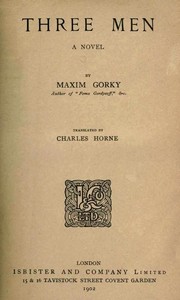Three Men: A Novel by Maksim Gorky
"Three Men: A Novel" by Maksim Gorky is a work of fiction written in the late 19th century. The story revolves around the lives of three men—Antipa, his son Jakov, and his brother Terenti—unfolding against a backdrop of rural Russian life, emphasizing themes of solitude, existential struggle, and the quest for understanding amidst the complexities of family dynamics and societal expectations. The opening introduces Antipa Lunev as a pious hermit whose past
burdens lead him to a life of prayer and isolation, setting the stage for an exploration of his legacy and the conflicting paths chosen by his sons. The beginning of the novel paints a vivid picture of Antipa's life, reflecting on his transformation from a worldly peasant to a hermit haunted by a profound sense of repentance. Following his death, the narrative shifts to his sons—Jakov, a rebellious and reckless figure, and Terenti, his timid, hunchbacked brother. The story hints at the challenges they face as they navigate their father's legacy and the struggles of rural life. Jakov's antagonistic relationship with society contrasts with Terenti's quiet endurance, revealing a tension between individual desires and familial responsibilities. As they deal with their father's stark choices and their consequences, the boys’ experiences encapsulate the harsh realities of life, underscored by Gorky's poignant observations on faith, morality, and human resilience. (This is an automatically generated summary.)
Read or download for free
| Reading Options | Url | Size | |||
|---|---|---|---|---|---|
| Read now! | https://www.gutenberg.org/ebooks/56456.html.images | 700 kB | |||
| EPUB3 (E-readers incl. Send-to-Kindle) | https://www.gutenberg.org/ebooks/56456.epub3.images | 334 kB | |||
| EPUB (older E-readers) | https://www.gutenberg.org/ebooks/56456.epub.images | 346 kB | |||
| EPUB (no images, older E-readers) | https://www.gutenberg.org/ebooks/56456.epub.noimages | 342 kB | |||
| Kindle | https://www.gutenberg.org/ebooks/56456.kf8.images | 536 kB | |||
| older Kindles | https://www.gutenberg.org/ebooks/56456.kindle.images | 521 kB | |||
| Plain Text UTF-8 | https://www.gutenberg.org/ebooks/56456.txt.utf-8 | 672 kB | |||
| Download HTML (zip) | https://www.gutenberg.org/cache/epub/56456/pg56456-h.zip | 326 kB | |||
| There may be more files related to this item. | |||||
Similar Books
About this eBook
| Author | Gorky, Maksim, 1868-1936 |
|---|---|
| Translator | Horne, Charles |
| Uniform Title | Troe. English |
| Title | Three Men: A Novel |
| Note | Wikipedia page about this book: en.wikipedia.org/wiki/Three_of_Them |
| Credits |
Produced by Dagny and Marc D'Hooghe at Free Literature (Images generously made available by the Internet Archive.) |
| Reading Level | Reading ease score: 82.4 (6th grade). Easy to read. |
| Language | English |
| LoC Class | PG: Language and Literatures: Slavic (including Russian), Languages and Literature |
| Subject | Russian fiction -- Translations into English |
| Category | Text |
| EBook-No. | 56456 |
| Release Date | Jan 28, 2018 |
| Copyright Status | Public domain in the USA. |
| Downloads | 6779 downloads in the last 30 days. |
| Project Gutenberg eBooks are always free! | |

